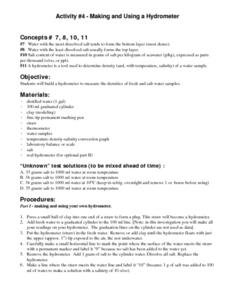Curated OER
Oceanography Worksheet #1
If you are teaching physical oceanography to middle school earth scientists, here is a terrific multiple choice worksheet. Learners look at a diagram of a landscape created by glacial sediment deposition and the resulting ocean floor....
Curated OER
Mixtures
For this chemistry worksheet, students use the clues given at the bottom of the sheet to complete the crossword puzzle on mixtures. There are 18 clues to solve on the sheet.
Curated OER
Its OK To Be a Clod
Students describe factors that affect the solubility of a chemical substance in seawater. In this sea environment lesson, student explain how information on the solubility of a substance can be used to measure water currents. They will...
Curated OER
The Oceanographic Yo-Yo
Students examine how oceanographers use chemical and physical parameters of seawater to locate hydrothermal vents. In this ocean lesson plan students complete an activity and worksheets.
Curated OER
Where Do Fish Live in the Hudson?
For this fish in the Hudson worksheet, middle schoolers read a brief excerpt about what types of fish can be found in the Hudson River in New York. They identify which fish are caught in greatest numbers and those caught in the most...
Curated OER
Making and Using a Hydrometer
Students build a hydrometer to measure the densities of fresh and salt water samples. They record the water temperature and density and use the temperature, density, and salinity conversion graph to locate the salinity. Finally,...
Curated OER
Precipitates and Black Smokers
Students discuss how hydrothermal fluid is different from seawater and what happens to it as it passes through the oceanic crust. They observe and manipulate calcuim chloride and baking soda to comprehend how precipates form.
American Geosciences Institute
American Geosciences Institute: Oceans
Seven hands-on lessons module in which students explore oceans. Inquiry-based investigations include properties of seawater, ocean water and currents, and features of the ocean floor.
Science Buddies
Science Buddies: Swimming in Acid: Understanding Ocean Acidification
The oceans are a precious natural resource, part of Earth's carbon cycle. But what happens if the oceans absorb too much carbon dioxide? Many scientists are concerned that the increased absorption of carbon dioxide is causing them to...
University of California
Understanding Science: Cold Fusion: A Case Study for Scientific Behavior
Major issue--the energy sources currently available to the world all have major drawbacks in the long term. Oil is efficient but leads to climate change. Coal is plentiful but polluting. Solar energy is appealing but only as dependable...
Scholastic
Scholastic News: Re Creating the Arctic
Studying sea ice in the Arctic region is very difficult. Read how scientists are using an innovative technique of freezing seawater in a pool to study sea ice.
University of California
Uc Davis Geo Wiki: Chemical Budgets of Oceanic Elements
To the extent that the composition of the ocean remains constant, the rate at which any one element is introduced into seawater must equal the rate of its removal. A listing of the various routes of addition and removal, together with...
National Institute of Educational Technologies and Teacher Training (Spain)
Ministerio De Educacion: Agentes Geologicos Ii
This unit will discuss how external geological agents shape different parts of our earth. It contains 15 interactive activities.
Other
College of Exploration: Ocean Literacy [Pdf]
A guide to help educators become ocean literate. The goal is to redress the lack of ocean-related content in state and national science education standards, instructional materials, and assessments. PDF (requires Adobe Reader).
Other
University of Texas at Dallas: Why Is the Sea Salty?
A clear and concise explanation of why some of the earth's waters are salty and others are not.
US Geological Survey
Usgs: "Thirsty? How 'Bout Seawater?"
This U.S. Geological Survey website explains the desalinization method used by some communities to change sea water into drinking water. Click Home to access the site in Spanish.
Cosmo Learning
Cosmo Learning: Blue Planet: Introduction to Oceanography
A collection of video lectures from an introduction to oceanography course taught at the University of California, Los Angeles. The course gives a general introduction to the processes and history of Earth's global oceanic system in...















